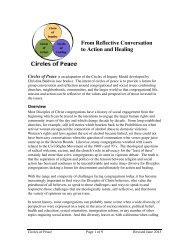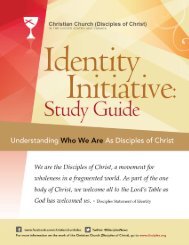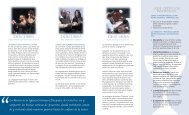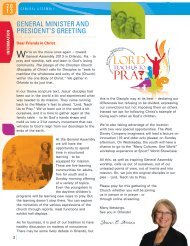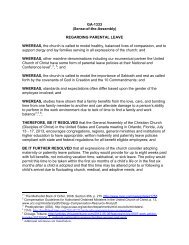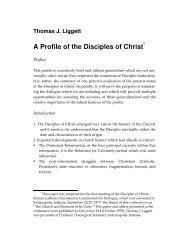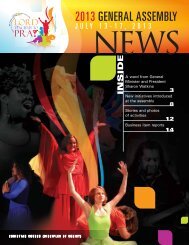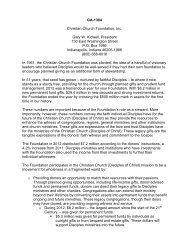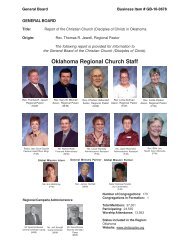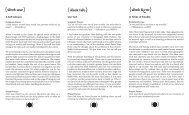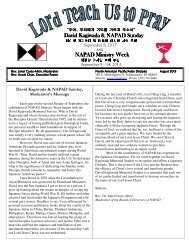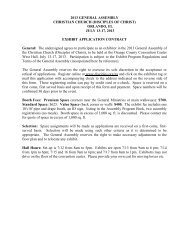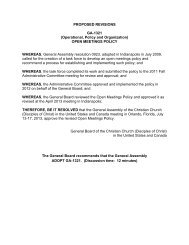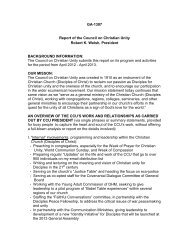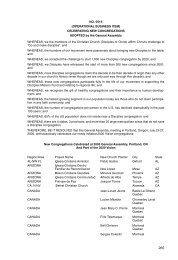RESOURCING THE CHURCH FOR ECUMENICAL MINISTRy A ...
RESOURCING THE CHURCH FOR ECUMENICAL MINISTRy A ...
RESOURCING THE CHURCH FOR ECUMENICAL MINISTRy A ...
Create successful ePaper yourself
Turn your PDF publications into a flip-book with our unique Google optimized e-Paper software.
prefer to spend more of my time in pursuit of<br />
koinonia, the more intense form of relationships<br />
one might say—a celebration at the Eucharistic Table<br />
where we truly share our God-given love for one<br />
another, where there is a mutual understanding of<br />
our deepest hopes and fears, emptiness and desires.<br />
But, alas, not belittling comments earlier today, but<br />
on a more practical level, the Communion that<br />
most of us share each Sunday at local Disciples<br />
churches where we go is usually short of such an<br />
experience.<br />
A bit of a secret for you all. Today is my 29th<br />
anniversary of staying sober. But in 29 years of<br />
continuously going to recovery meetings, I have<br />
experienced the rather extraordinary relationships<br />
one can have with another human being. The<br />
tragedies and disasters that can befall any of us are<br />
openly and honestly explored for possible insights<br />
and learnings, the celebrations and blessings<br />
recognized as absolute miracles. As one recent<br />
friend is fond of saying, “There is absolutely no way<br />
that someone like me can travel from a freezer box<br />
on Pacific Avenue and end up where I am today.<br />
Absolutely no way. Yet here I am, thanks be to God.”<br />
That sort of caring for one another, joining in our<br />
journeys, traversing our troubles, living high on life<br />
together, is something that we in the Church could<br />
learn a little bit about.<br />
What the current literature of our day tells us about<br />
people’s spiritual yearnings is that more than<br />
anything, people desire relationships—trusting,<br />
meaningful, respectful relationships. It is paramount<br />
that our congregations hear that good news<br />
and identify one, or maybe two, of God’s gifts to the<br />
church that will provide people with avenues<br />
towards such relationships. Not the mechanics of<br />
small group ministry, but gifts from God, or<br />
charisms.<br />
Let me apply such thinking to ecumenism, or<br />
Christian Unity as lived out in the local community.<br />
Remember that in the Pacific Northwest there are<br />
but 35% of the people who even claim any religious<br />
affiliation. Yes, 35%. Unlike Minnesota where I<br />
spent the last 15 years, where 65% claimed to<br />
regularly participate in a religious congregation. It<br />
was Dr. Patricia Killen, Provost of Pacific Lutheran<br />
University at the time, who penned what has been a<br />
very popular book called The None-Zone, playing off<br />
of the recent polls that report a growing, even a<br />
majority of people in the Pacific Northwest who are<br />
Morton • Contextual and Local Ecumenism<br />
24<br />
claiming “none” as the category for their religious<br />
affiliation.<br />
A board member of Associated Ministries, Dr.<br />
Kathy Russell, has been a close colleague of Dr.<br />
Killan’s, so she brought the three of us together. For<br />
more than two hours we explored the two charisms<br />
Associated Ministries would like to lift up for the<br />
community. Two charisms that are God’s gifts to and<br />
for the ecumenical movement: 1) the gift of unity<br />
(read “relationships”) and 2) the gift of dialogue.<br />
While these gifts are not exclusively to the ecumenical<br />
movement, it has been the ecumenical<br />
movement that has spent more time, energy and<br />
resources living into them than any other expression<br />
of the Church.<br />
First, the church is a center for the<br />
community who gathers for worship and<br />
fellowship. Some sociologists would call this<br />
the bonding of the community.<br />
Through the gift of unity and dialogue, Associated<br />
Ministries will develop community-based dialogues.<br />
That is to say, we will develop relationships<br />
amongst churches in local communities throughout<br />
Pierce County. In North Tacoma, the West Slope of<br />
Tacoma, East Side of Tacoma, South Tacoma,<br />
different parts of Puyallup, communities within the<br />
City Lakewood, University Place, Firerest, rural<br />
communities of Sumner, Graham, Eatonville.<br />
Where there is interest and energy, we will bring<br />
clergy and lay leaders together, strengthening<br />
relationships in the local communities, and invite<br />
people in those relationships to explore the topics<br />
and issues that are of most concern to their<br />
particular community through dialogue. Genuine<br />
dialogue: expressing commitments to firmly held<br />
beliefs, while listening deeply and intently with<br />
respect to the other. In more secular worlds one<br />
might think of this as civic engagement.<br />
As congregations of all denominational stripes are<br />
increasingly living into a congregational polity, it<br />
seems that we are going to have to explore what it<br />
means to be the church today. Let me share my latest<br />
way of describing the church. It seems to me that the<br />
church is the center for the community in two ways.<br />
First, the church is a center for the community who<br />
gathers for worship and fellowship. Some sociol-



